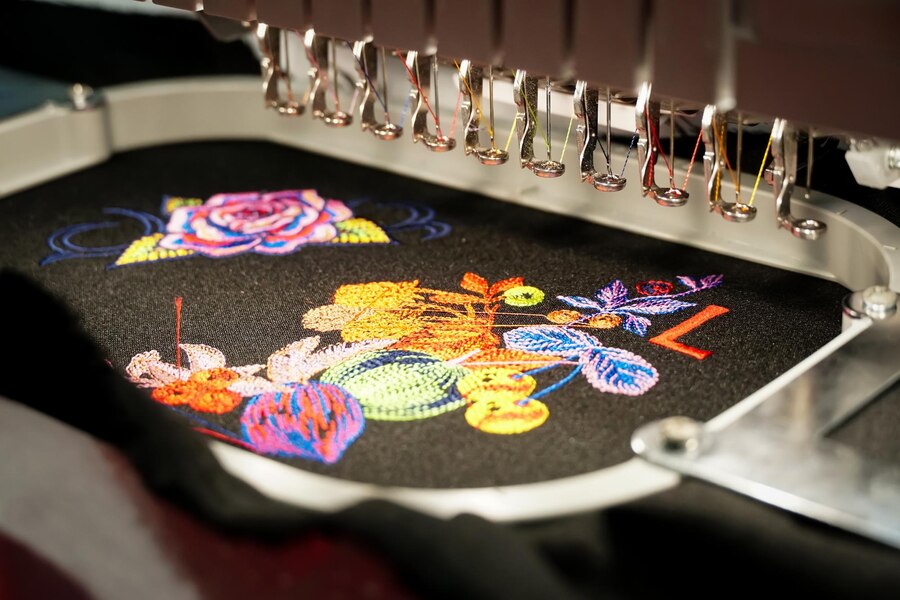Embroidery, the art of decorating fabric with needle and thread, has been a cherished craft for centuries. From simple monogramming to intricate designs, embroidery adds a touch of elegance and personalization to various items. In the modern era, embroidery services have evolved into specialized businesses offering a wide range of services to individuals and organizations. These services utilize advanced computerized embroidery machines to create precise and intricate designs, catering to the diverse needs of customers.
In this article, we will explore the world of embroidery services, from the basics of embroidery to the different types of services offered, the technology behind the craft, and the various industries that rely on these services. We will also delve into the benefits of using embroidery services, tips for choosing the right provider, and the future of embroidery in the digital age.
Understanding Embroidery: A Brief Overview
Embroidery is a form of decorative art that involves stitching patterns or designs onto fabric using a needle and thread. This craft has a rich history, dating back thousands of years, and has been used across cultures to embellish clothing, accessories, and household items.
The History of Embroidery
The history of embroidery is as varied as the designs it produces. From ancient China to medieval Europe, embroidery has been used to signify status, commemorate events, and express creativity. Historical techniques, such as hand embroidery, have evolved with technological advancements, leading to the modern methods we see today.
Types of Embroidery Techniques
There are various embroidery techniques, each with its unique style and application. Some of the most common types include:
Hand Embroidery: Traditional method involving manual stitching.
Machine Embroidery: Uses automated machines for faster production.
Appliqué: Involves stitching fabric onto another fabric base.
Cross-Stitch: Creates patterns using X-shaped stitches.
Satin Stitch: Provides a smooth, satiny surface with tightly spaced stitches.
The Role of Embroidery Services in Modern Craftsmanship
Embroidery services have become an essential part of the modern crafting and textile industry. These businesses provide professional embroidery solutions to individuals, small businesses, and large organizations, ensuring that designs are executed with precision and quality.
What Are Embroidery Services?
Embroidery services are specialized businesses that offer custom embroidery work to clients. These services can range from simple monogramming of initials on clothing to complex designs on large textile pieces. The services are often tailored to meet the specific needs of clients, whether for personal use, corporate branding, or large-scale production.
The Process of Embroidery Services
The embroidery process typically involves the following steps:
Consultation: Understanding the client’s needs and design preferences.
Design Creation: Using software to create a digital version of the design.
Machine Setup: Loading the design into a computerized embroidery machine.
Stitching: The machine executes the design on the chosen fabric.
Finishing: Trimming excess threads and preparing the final product.
Types of Embroidery Services Offered
Embroidery services offer a variety of options to cater to different needs and preferences. Whether you’re looking for personalized gifts, corporate branding, or large-scale textile production, there’s an embroidery service that can meet your requirements.
Custom Embroidery
Custom embroidery services allow clients to create unique designs tailored to their specific needs. This could include:
Monogramming: Adding initials or names to clothing, accessories, or household items.
Logo Embroidery: Stitching company logos onto uniforms, promotional items, or merchandise.
Personalized Gifts: Creating one-of-a-kind gifts for special occasions, such as weddings, birthdays, or anniversaries.
Corporate Embroidery
Corporate embroidery services are designed to meet the branding needs of businesses. These services typically include:
Uniform Embroidery: Customizing employee uniforms with company logos or names.
Promotional Products: Embroidering logos on items like hats, bags, or towels for marketing purposes.
Corporate Gifts: Offering personalized corporate gifts, such as embroidered towels or bags, to clients or employees.
Bulk Embroidery Services
For large-scale production needs, bulk embroidery services offer efficient and cost-effective solutions. This service is ideal for:
Sports Teams: Creating matching uniforms with team logos and player names.
Event Merchandise: Producing large quantities of embroidered items for events like festivals or trade shows.
Retail Production: Manufacturing embroidered products for sale in retail stores.
The Technology Behind Modern Embroidery
The advent of technology has revolutionized the embroidery industry, making it possible to create complex designs with precision and speed. Modern embroidery services rely heavily on computerized embroidery machines and specialized software.
Computerized Embroidery Machines
Computerized embroidery machines are at the heart of modern embroidery services. These machines are equipped with multiple needles and threads, allowing for multicolored designs to be stitched in one go. Key features of these machines include:
Precision: Ability to replicate intricate designs with high accuracy.
Speed: Faster production times compared to manual embroidery.
Versatility: Capable of working on various types of fabrics and materials.
Embroidery Software
Embroidery software plays a crucial role in the design process. It allows designers to create digital patterns that can be easily transferred to embroidery machines. Some of the functions of embroidery software include:
Design Creation: Crafting and editing embroidery patterns digitally.
Digitization: Converting artwork into a format that the embroidery machine can read.
Simulation: Previewing how the design will look once stitched on fabric.
Industries That Rely on Embroidery Services
Embroidery services are utilized across a wide range of industries. From fashion to sports, businesses of all kinds rely on embroidery to enhance their products and brand identity.
Fashion Industry
In the fashion industry, embroidery is used to add decorative elements to clothing, accessories, and footwear. High-end designers often incorporate intricate embroidery into their collections, creating unique and luxurious pieces.
Corporate Sector
Businesses use embroidery to reinforce their brand identity. Whether it’s through embroidered uniforms or promotional products, companies can create a cohesive and professional image with custom embroidery.
Sports Teams
Sports teams at all levels, from amateur to professional, utilize embroidery services to create uniforms, hats, and other gear. Embroidered logos, player names, and numbers help to unify teams and promote team spirit.
Hospitality and Service Industry
Hotels, restaurants, and other service-oriented businesses often use embroidery to personalize uniforms, towels, and linens. This not only enhances the customer experience but also reinforces brand recognition.
Benefits of Using Professional Embroidery Services
There are numerous benefits to using professional embroidery services, whether you’re an individual looking for personalized items or a business aiming to strengthen your brand.
High-Quality Results
Professional embroidery services ensure that your designs are executed with precision and durability. The use of advanced machines and skilled technicians guarantees a high-quality finished product.
Customization and Personalization
Embroidery services offer a high level of customization, allowing you to create unique designs that reflect your personal style or brand identity. From color choices to design placement, every aspect can be tailored to your preferences.
Durability
Embroidered designs are known for their longevity. Unlike printed designs that may fade over time, embroidery is more resistant to wear and tear, making it ideal for items that will be frequently used or washed.
Professional Appearance
For businesses, embroidered uniforms and promotional items convey professionalism and attention to detail. This can enhance your brand’s image and leave a lasting impression on clients and customers.
Choosing the Right Embroidery Service Provider
Selecting the right embroidery service provider is crucial to ensuring that your designs are executed to your satisfaction. Here are some factors to consider when choosing an embroidery service.
Experience and Expertise
Look for a provider with extensive experience in the embroidery industry. Experienced providers are more likely to have the skills and knowledge needed to handle complex designs and large orders.
Portfolio and Samples
Review the provider’s portfolio to assess the quality of their work. Ask for samples to see firsthand how their embroidery looks on different types of fabric.
Customer Reviews and Testimonials
Check online reviews and testimonials from previous clients. Positive feedback can give you confidence in the provider’s ability to deliver high-quality results.
Pricing and Turnaround Time
Compare pricing and turnaround times between different providers. While cost is an important factor, be sure to balance it with the quality of work and the provider’s ability to meet your deadlines.
The Future of Embroidery Services in the Digital Age
As technology continues to advance, the future of embroidery services looks promising. The integration of digital tools and automation is expected to further enhance the precision, efficiency, and creativity of embroidery services.
Innovations in Embroidery Technology
The embroidery industry is likely to see continued innovation in machine technology and software. This could include more advanced automation features, better integration with digital design tools, and improvements in stitching techniques.
Sustainability in Embroidery
As sustainability becomes a key concern for consumers and businesses, the embroidery industry is also adapting. Eco-friendly threads, sustainable fabrics, and energy-efficient machines are likely to become more prevalent in the industry.
Expanding Market Opportunities
With the rise of e-commerce and personalized products, embroidery services are poised to tap into new market opportunities. From custom apparel to home décor, the demand for embroidered products is expected to grow.
Conclusion
Embroidery services offer a unique blend of traditional craftsmanship and modern technology, providing personalized and high-quality solutions for a wide range of needs. Whether you’re an individual looking to add a personal touch to your belongings or a business aiming to enhance your brand identity, embroidery services can help bring your vision to life. As the industry continues to evolve with advancements in technology and sustainability, the future of embroidery services looks bright, promising even more creative possibilities for customers and businesses alike.







